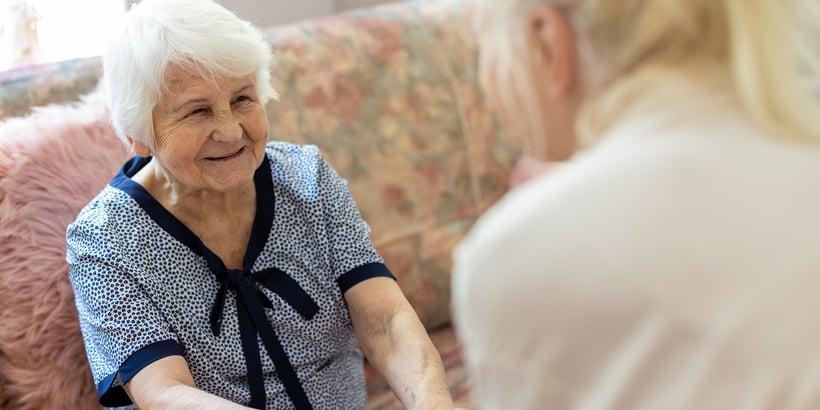 If you’re caring for someone with dementia, you will soon realize that there are no rules.
If you’re caring for someone with dementia, you will soon realize that there are no rules.
Everything changes when your loved one has dementia, not just their memory. Often, the right thing to do is the opposite of what seems like the right thing to do.
“There are skills you’re going to need,” says Highgate at Flagstaff’s Resident Care Coordinator or CRC. “How you do what you do becomes incredibly important.”
For example, memory loss is frequently accompanied by changes to appetite and eating habits. If you focus on the how of eating a meal, you might get frustrated when your loved one gets distracted while eating or when a spoon meets pursed lips.
Instead, it helps to understand that the person with memory loss is doing the best they can, and if something isn’t working, it’s your responsibility to change your approach toward the person living with dementia. Work to discover what can be done differently to address the challenging situation.
“Dementia care expert, Teepa Snow, says that one of the most important things you can do is quit being a caregiver and become a care partner,” Flagstaff's CRC says.
Here are five tips for family members caring for someone with memory loss that can help you step into that partner role.
1. Learn More About Dementia
It's important to remember that your loved one is coping with a progressive brain disease, not just memory loss. Over time, dementia will change each of your loved one’s senses.
“Your loved one may have excellent hearing, but due to changes in their brain, they’re unable to process certain sounds and interpret what they hear accurately,” the Community Relations Coordinator says. “Or dementia might impact their brain’s ability to interpret what they see, so your loved one might lose their ability to comprehend what or who is in front of them.”
Each person’s experience will be different, so it’s hard to predict what changes your loved one might experience. That’s why it’s so important to learn more about Alzheimer’s or other forms of dementia. You need to learn about what dementia does, what it doesn’t do, and what it’s going to mean for you and your loved one.
Keep in mind that, for many people, plans usually include memory care. Consider speaking with your loved one and family members sooner rather than later. That way, you’ll understand your loved one’s wants and desires and will be able to incorporate them into the plan, even as their health or needs change.
2. Make a Daily Routine
Both you and your loved one with memory loss might become frustrated as once-simple tasks become difficult. To reduce agitation, it helps to devise a daily routine.
“Think about when your loved one is most alert and refreshed, and adapt your routine to make the most of those moments,” the CRC says. “But make sure to leave room for flexibility. Always schedule more time for tasks than you normally would so you aren’t rushed and your loved one can take breaks if necessary.”
This Meal Planning Worksheet for Older Adults can help you create a grocery game plan, and our Physical Activity Planner can help you come up with creative ways to incorporate physical activity with a loved one into your daily routine.
3. Create Opportunities for Your Loved One to Stay Active and Engaged
Keeping someone with memory loss actively engaged in everyday activities and doing cognitively challenging tasks is good for their mind, body, and spirit. “For someone with progressive memory loss, ‘activities’ can be anything they do from the moment they get up in the morning to when they go to bed at night,” says Flagstaff’s Life Enhancement Coordinator.
When it comes to creating meaningful interactions with a loved one experiencing memory loss, think about their past or present hobbies, interests, or work. For example, if your loved one was always active in a book club but is no longer able to read, try reading to them. If they loved their pet, plan visits for them to interact with a furry friend. If they used to take pleasure in organizational tasks or cleaning the house, activities around the home, such as folding laundry or organizing a messy drawer, can help them feel involved and enhance their self-esteem.
Helping your loved one remain active through personalized activities is important. It helps them maintain a sense of self-worth and gives them purpose and enjoyment.
4. Focus on the Why, Not the How
Teepa Snow says her Positive Approach to Care is all about loving and respecting those living with memory loss for who they are now and helping them to make the most of it.
When you’re trying to get things done — doing household chores, eating a meal, navigating bedtime — it’s not always easy to focus on what can be done rather than what can’t. For example, it’s normal to want to help your loved one with things, such as buttoning their shirt or tying their shoes. However, this can often lead to them becoming fully dependent on you too soon.
Instead of focusing on, for example, the how of buttoning a shirt, focus on why it’s important that your loved one buttons their shirt if they can: Being allowed to carry on with everyday activities for as long as possible — no matter how long it takes — gives your loved one the opportunity to improve their cognitive skills and potentially slow down their decline. It also helps make them feel valued and successful in completing a task or activity.
5. Learn the Art of Letting it Go
It can be difficult to process the changes that are happening as your loved one’s dementia progresses. Even if their shoes aren’t matching or the buttons they’ve just buttoned don’t line up, find ways to turn a mistake into a success.
For example, compliment your mom on the outfit she chose or thank your dad for setting the table (even if there are a few items missing). As a caregiver, your parent’s gauge on a successful day is as much dependent on what you say as it is on what they accomplished.
It’s easy to get down as a caregiver. If you’re feeling ambivalent, irritable, or tired, notice how your mood impacts your interactions. Consider visiting when you’re feeling up for it, not when you feel obligated to.
When emotions are heightened, sometimes the best thing you can do for your loved one, and for yourself, is to take a break. It may only need to be for a few minutes or a few hours, but taking time to recharge prevents caregiver burnout. If family or friends are unable to help you, a respite stay at a memory care community can give both you and your loved one a much-needed break.
To learn more about respite care or memory care at Highgate at Flagstaff, request more information.





